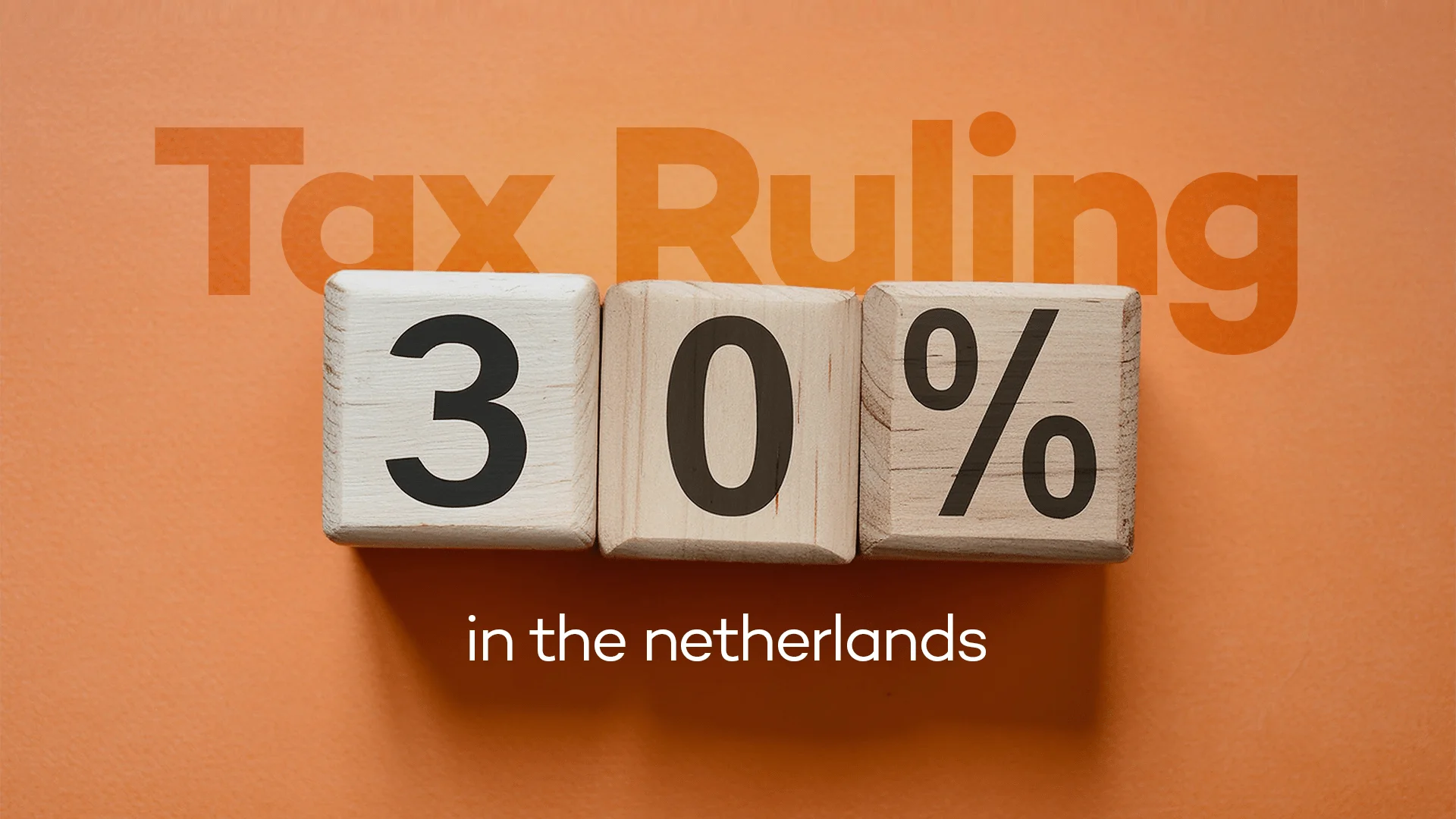Are you considering coming to the Netherlands to work in a highly skilled area? If so, the 30% ruling, a Dutch tax advantage that can significantly benefit expat and international employees, may be of interest to you!
In this blog post, we’ll dive deep into the 30% rule in Netherlands, exploring its benefits, eligibility criteria, and application process.
What is the 30% ruling and how does it work?
Highly skilled employees who move to the Netherlands to work for you may run into so-called extraterritorial costs. These are costs related to moving to the Netherlands but also the extra costs of living here, which can be higher than in the home country.
The 30% ruling (also known as the 30 Dutch tax ruling or as the 30% facility) is a tax advantage for highly skilled migrants working in the Netherlands.
Under this rule, employers can pay 30% of the employee’s salary as a tax-free allowance, effectively reducing the amount of income tax the employee pays.
This reimbursement is designed to help offset the extra expenses that come with moving to a new country and ease the financial burden of living and working abroad for an expat employee.
As of 1 January 2024, the 30% ruling has been decreased to the 30/20/10% rule.
What are the financial benefits of the 30% ruling?
The 30 rule Netherlands tax benefit can result in substantial savings for eligible foreign employees too. Here’s how:
- 30% of the gross salary is tax-free
- Reduced taxable income leads to lower overall tax liability
- Option to be treated as a partial non-resident taxpayer, potentially excluding foreign assets from Dutch taxes
For example, if an employee earns €100,000 per year, the 30% ruling would result in €30,000 being tax-free, leaving only €70,000 subject to income tax. This can lead to significant savings, especially for high-income earners.
Decrease to 30/20/10% rule
It’s essential to note that the Dutch government has announced changes to the 30% ruling. From 2024, the tax-free allowance will gradually decrease:
- Step-by-step Reduction
As of 1 January 2024, the 30% ruling has been decreased to the 30/20/10% rule. This rule is applied for a maximum duration of 60 months / five years but will decrease progressively.
- In the first 20 months, eligible individuals will continue to receive 30% of their gross salary tax free.
- In the following 20 months, the tax-free allowance will be reduced to 20%.
- Finally, in the subsequent 20 months, the allowance will decrease to 10%.
The changes only apply to individuals who begin using the 30% facility on or after 1 January 2024. Those already benefiting from the facility will remain unaffected, and will continue to receive 30 percent of their gross salary tax free for the full five years.
- Applicable to a maximum of the salary
As of January 1, 2024, the 30% facility only applies to salaries up to a certain maximum, which is set by the Standards for Remuneration Act (Wet Normering Topinkomens). This is the so-called maximum remuneration (Balkenende-norm in Dutch).
This maximum salary cap is €233,000 per year. Any income above this threshold is not eligible for the 30% ruling.
- Termination of partial foreign tax liability
From 1 January 2025, employees who use the 30% ruling can no longer apply the so-called partial foreign tax liability (partiële buitenlandse belastingplicht) in their income tax return. Currently, they are seen as a foreign taxpayer, even though they live and work in the Netherlands, for their taxable income from substantial interest (box 2) and from savings and investments (box 3). This means they do not have to pay taxes in Box 2 and Box 3 on foreign capital income.
From 1 January 2025, they will have to file their taxable income from substantial interest and savings and investments in the Netherlands.
Starting 1 January 2025, the partial non-resident taxpayer status will be abolished. A transitional rule will apply, allowing expats to use this status until the end of 2026, subject to certain conditions.
This phased reduction makes it crucial for expats to understand and plan for these changes.
Customer Success Story
See how a PEB company simplified global hiring and acquired talent across borders efficiently with PamGro.
Who is eligible for the 30% ruling?
The 30 ruling requirements and 30 ruling criteria include:
- Employee must be recruited from abroad or transferred to a Dutch employer. If you are self-employed, it is not possible to claim the 30% ruling.
- Employee must have specific expertise that is scarce in the Dutch labor market. These skills are determined by several factors such as salary, age, employment history, education and level of employment. None of these are conclusive but the combination of all aspects determines your specific skills.
- Employee’s taxable salary must meet a minimum threshold (adjusted annually). The minimum taxable salary for 30% ruling beneficiaries in 2024 is €65,868, with a lower threshold of €50,069 for master’s degree holders under 30. These amounts ensure that salaries remain above these levels when the 30% tax ruling is applied. Note that these thresholds are updated annually on January 1.
- Employee must have lived more than 150 km from the Dutch border for 16 out of 24 months before starting work in the Netherlands. As such, expat employees from Belgium, Luxembourg, Northern France, large parts of Germany, and a small part of the UK cannot claim the 30% ruling.
- Additionally, the employee must not have been employed in the Netherlands in the past 25 years, and the employer must have a valid employment contract with the employee.
How to apply for the 30% ruling in the Netherlands?
- Employer and employee must jointly file an application with the Dutch Tax Office
- Application should be submitted within 4 months of the employee’s start date. You will receive the outcome within 10 weeks. You will find the application form on the website of the Tax Administration.
- Required documents include employment contract, payslips, and proof of residence history. The application form indicates which documents must be submitted.
- It’s recommended that employers and employees work with a tax professional to ensure the application is complete and accurate.
Change of Employer
If an employee was previously receiving the 30% ruling benefit from their former employer, their new employer cannot simply take over this benefit. Instead, the new employer and employee must jointly submit a fresh application to utilize the 30% ruling.
On the other hand, if a company undergoes a takeover, employees who were already receiving the 30% ruling benefit will be able to retain this arrangement when they transition to the new company. This ensures continuity and stability for these employees.
Need help applying for the 30 percent ruling?
The 30% ruling offers significant tax advantages for eligible expats working in the Netherlands. However, with upcoming changes and strict eligibility criteria, it’s essential to understand the ins and outs of this tax benefit.
As an EOR company, PamGro is here to help navigate these complexities and ensure our clients and their employees make the most of opportunities like the 30% rule.
FAQs
1. How long does the 30% ruling last?
As of 2019, the maximum duration is 5 years. Applications approved between 1 January 2012 and 1 January 2019 had a maximum duration of 8 years, but new legislation may affect the end date.
2. Can I still benefit if I've lived in the Netherlands before?
It depends on your specific situation. Generally, you must have lived outside the Netherlands for at least 25 years of your life.
3. Does the 30% ruling apply to all income?
No, it only applies to income from employment. Other sources of income are taxed normally.
4. What happens if I change jobs?
You may be able to transfer the ruling to a new employer, provided you meet all criteria and apply within three months of changing jobs.
5. Is the 30% ruling guaranteed if I meet all criteria?
While meeting criteria improves your chances, approval is at the discretion of the Dutch Tax Office.
Payroll Solutions Unrivalled since 15 Years








